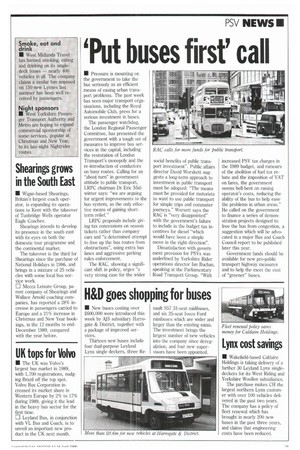Put buses first' call
Page 29

If you've noticed an error in this article please click here to report it so we can fix it.
• Pressure is mounting on the government to take the bus seriously as an efficient means of easing urban transport problems. The past week has seen major transport organisations, including the Royal Automobile Club, press for a serious investment in buses.
The passenger watchdog, the London Regional Passenger Committee, has presented the government with a tough set of measures to improve bus services in the capital, including the restoration of London Transport's monopoly and the re-introduction of conductors on busy routes. Calling for an "about turn" in government attitude to public transport, LRPC chairman Dr Eric Midwinter says: "we are arguing for urgent improvements to the bus system, as the only effective means of gaining shortterm relief."
LRPC proposals include giving tax concessions on season tickets rather than company cars and "a determined attempt to free up the bus routes from obstructions", using extra bus lanes and aggressive parking rules enforcement.
The RAC, showing a significant shift in policy, urges "a very strong case for the wider social benefits of public transport investment". Public affairs director David Worskett suggests a long-term approach to investment in public transport must be adopted: "The means must be provided for motorists to want to use public transport for simple trips and commuter journeys." Worsett says the RAC is "very disappointed" with the government's failure to include in the budget tax incentives for diesel "which would have been a simple move in the right direction".
Dissatisfaction with government provision for PSVs was underlined by Yorkshire Rider operations director Ian Buchan, speaking at the Parliamentary Road Transport Group. "With increased PSV tax charges in the 1989 budget, and rumours of the abolition of fuel tax rebate and the imposition of VAT on fares, the government seems hell-bent on raising operator's costs, reducing the ability of the bus to help ease the problems in urban areas." He called on the government to finance a series of demonstration projects designed to free the bus from congestion, a suggestion which will be advocated in a major Bus and Coach Council report to be published later this year.
Government funds should be available for new pro-public transport highway measures and to help the meet the cost of "greener" buses.
























































































































































